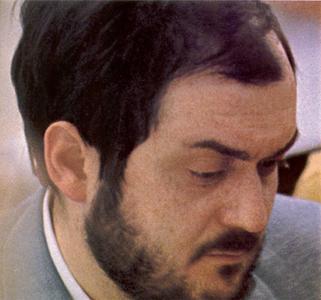
 |
| Stanley Kubrick |  |
Although Stanley Kubrick is only thirty-nine, the techniques used in 2001 represent his experience of nearly twenty years of movie making. He was born in New York City on July 26, 1928, the son of a doctor still in practice. As a high school student his main professional interest was in becoming a jazz drummer, and in the house near London where he lives now, there is a set of drums which he plays from time to time. The normal high school curriculum didn't much appeal to Kubrick-he believes that schools should concentrated on the teaching of "problem solving" and not on rote memorization of the characters in books and plays- and after high school at the age of seventeen, he immediately went to work for Look magazine as a photographer. For the next four years he worked for Look and the experience that he gained in the techniques of photography have been useful ever since. Probably no director in films involves himself more deeply in photographic techniques than Kubrick and the new ideas in photography used in 2001 could probably fill a text book. While still at Look he started making documentary films and then experimental feature films such asFear and Desire and Killer's Kiss. In making these films Kubrick attended to the whole production himself, renting and running the cameras, selecting and directing the actors, writing the script and raising the money, mainly from relatives. While the early films were praised, movie companies remained aloof and again during this period Kubrick helped to support himself playing chess for quarters. He met James Harris, who was, like Kubrick, twenty six at the time, and together they produced The Killing, about a race track robbery, Paths of Glory, an anti war picture set in the First World War, and Lolita which is about Lolita. Then Harris began a career as a director, and Kubrick began working on Dr Strangelove.Dr Strangelove is one of the most unconventional films ever made-a comedy about thermo-nuclear warfare. Like most great comedies it is profoundly serious and very sad-the film ends with the destruction of the world. Kubrick tends to be somewhat pessimistic and sceptical by nature-he will not fly although he is a licensed pilot-and he is rather dubious about the ability of the human race to survive, in the long run, its capacity for inventing weapons of mass destruction. He came to the conclusion that space exploration might be the only thing that the human race could learn to do which would keep it from blowing itself up. Once he becomes interested in a general theme, Kubrick absorbs information about it from all sides like a sponge and while he was working with Arthur C Clarke on 2001-he once estimated that they had spent 2,400 hours writing a script that has become an MGM movie with a running time of two hours and forty minutes - he read every book on science and science fiction that he felt might help him in creating a movie about space. He talked to innumerable scientists and even hired consultants from the national space program to be sure that the film was completely authentic. 2001 is a craftsman's mixture of science and fantasy-fantasy that is all the more intriguing since it might very well become reality sooner than we think. After seeing some of the rushes of 2001 in London, Kubrick's old friend and partner James Harris remarked, "It will be the only picture ever made after which people who have seen it will day that they have never seen anything like it-and they'd be right." |
| 
 |